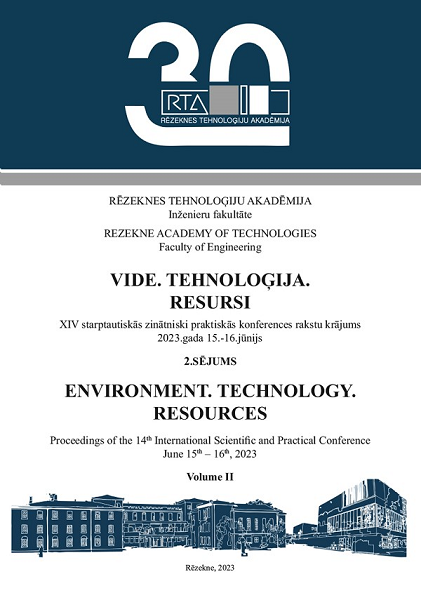VIDEO PROJECTS AS A COMPONENT OF INCLUSIVE COMPETENCE OF FUTURE TEACHERS
DOI:
https://doi.org/10.17770/etr2023vol2.7257Keywords:
inclusive competence, teachers’ trainings, video projectsAbstract
In our paper, we propose to focus on the use of video products in the educational process of teacher education in Ukraine.
First of all, it is important for us to present a justification of the features and importance of using video projects as part of theoretical material / educational content / online and offline courses. After all, the use of video projects allows to deepen the knowledge of future teachers, including audiovisual involvement in the perception of terminology, complex elements of teacher organization, legislation or other theoretical aspects.
Secondly, we believe that it is worth noting and presenting the experience of Ukrainian students of pedagogical specialties' involvement in video projects (in particular, the creation of a social video, etc.). After all, such work allows you to reassess your own skills in using technology, acquire new knowledge, formulate a strategy for implementing project-based learning in secondary school practice, and build strong cause-and-effect relationships between the knowledge and experience of using it through technology and social media.
All of this together allows us to observe the formation of a future teacher who is not separated from the challenges of the technology world, but who uses the opportunities of our time in a harmonious and high-quality way.
References
D. Masats & M. Dooly. Rethinking the use of video in teacher education: A holistic approach. Teaching and Teacher Education, 27(7), 1151-1162. 2011.
N. V. Morze, O. H. Hlazunova & M. V. Mokriiev. Metodyka stvorennia elektronnoho navchalnoho kursu (na bazi platformy dystantsiinoho navchannia Moodle 3). Navchalnyi posibnyk. Kiev. 240. 2016.
O. M. Spirin, O. V. Bazeliuk, L. M. Petrenko, A. A. Kalenskyi & L. A. Maiboroda. Tekhnolohii dystantsiinoho profesiinoho navchannia. Zhytomyr: «Polissia». 160. 2018.
S. V.Hakhovych & T. V. Savchenko. Teoretychni ta praktychni aspekty vykorystannia systemy dystantsiinoho navchannia. Zbirnyk naukovykh prats Viiskovoho instytutu Kyivskoho natsionalnoho universytetu imeni Tarasa Shevchenka, (56), 210-116. 2017.
C. M. Chen & C. H. Wu. Effects of different video lecture types on sustained attention, emotion, cognitive load, and learning performance. Computers & Education, 80, 108-121. 2015.
T. Hatch, J. Shuttleworth, A. T.Jaffee & A. Marri. Videos, pairs, and peers: What connects theory and practice in teacher education?. Teaching and Teacher Education, 59, 274-284. 2016.
S. Cherrington & J. Loveridge. Using video to promote early childhood teachers' thinking and reflection. Teaching and Teacher Education, 41, 42-51. 2014.
H. Van der Meij. Reviews in instructional video. Computers & education, 114, 164-174. 2017.
Inkliuzyvna osvita. Vidkryta hrupa studentiv ta praktykiv inkliuzyvnoi osvity VDPU. Sotsialna merezha FaceBook. Available at: https://www.facebook.com/groups/575634056407912
Yu. V. Tryus, I. V. Herasymenko & V. M. Franchuk. Systema elektronnoho navchannia VNZ na bazi MOODLE: metodychnyi posibnyk. ChDTU. Cherkasy. 220. 2012.
C. Tømte, A. B. Enochsson, U. Buskqvist & A. Kårstein. Educating online student teachers to master professional digital competence: The TPACK-framework goes online. Computers & Education, 84, 26-35. 2015.



